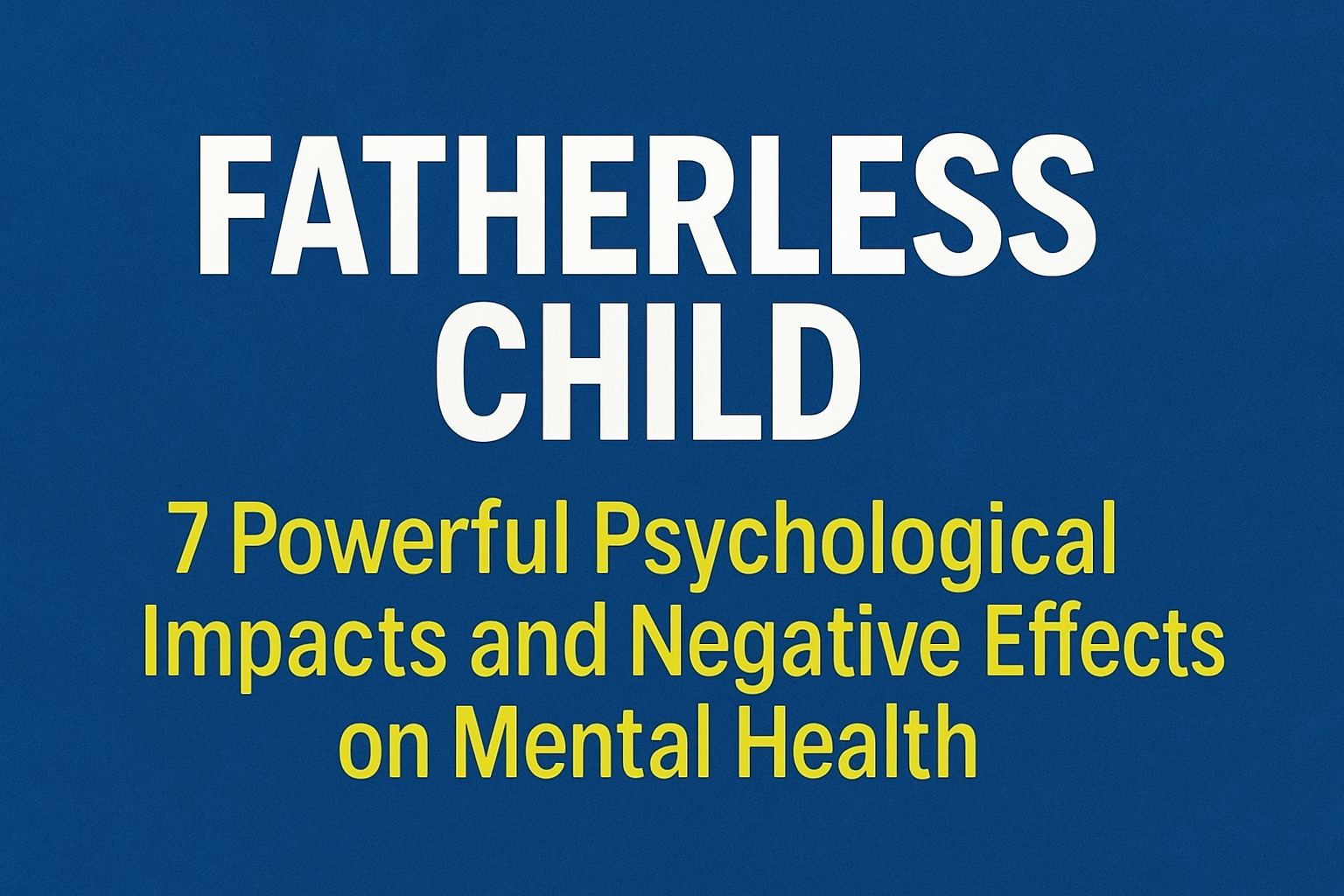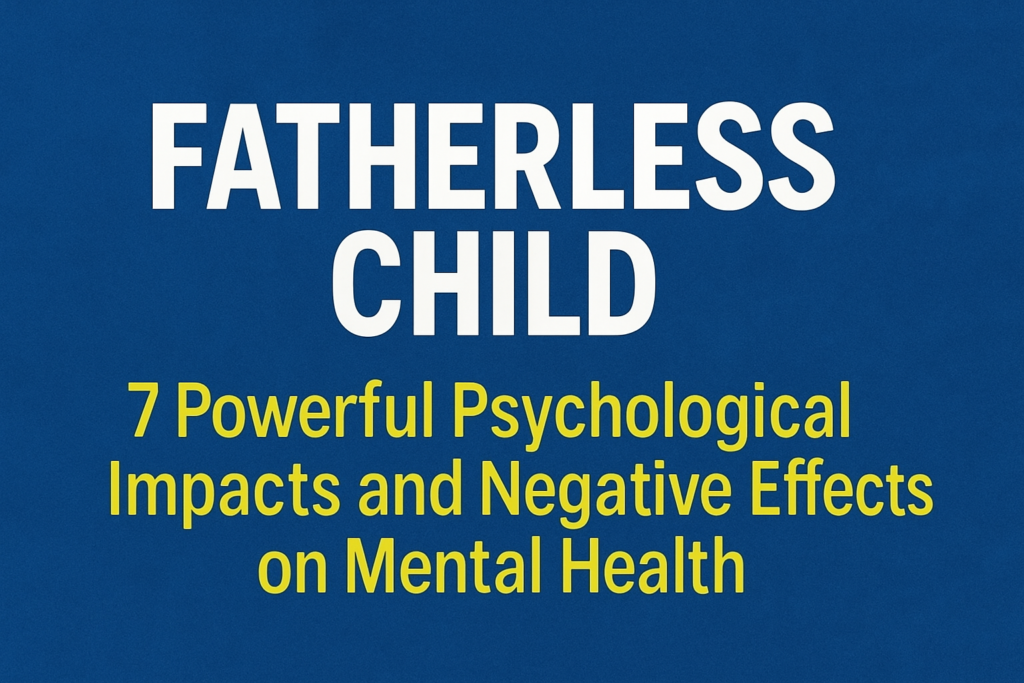
Fatherless Child: 5 Critical Mental Health Risks No One Talks About
The Hidden Impact on Mental Health on a Fatherless child
Growing up with both parents is often considered an emotional anchor for children. However, not every child has that privilege. When a child is raised without a father, the absence leaves behind emotional gaps that can influence personality, behavior, and long-term wellbeing. While every child’s experience is unique, psychologists and researchers have highlighted how this absence can deeply shape mental health and social development.
Emotional Security and Mental Health Challenges of Fatherless Children
A father often represents security, guidance, and a sense of protection in a child’s life. When that figure is missing, the child may experience feelings of uncertainty and vulnerability. This lack of emotional security can lead to:
- Higher levels of anxiety and stress
- Difficulty forming safe attachments
- A constant search for validation
These factors directly impact a child’s mental health, making them more prone to emotional instability.
The Role of Father Figures in Mental Health Development
Fathers play a crucial role in shaping self-esteem, confidence, and problem-solving skills. Children who grow up without a father may lack this essential influence. Instead, they often rely heavily on their mothers or external figures like teachers, coaches, or extended family members. While these figures can provide support, the absence of a father figure still leaves a psychological void.
Research suggests that children raised without fathers are more likely to struggle with identity issues, which may result in confusion, lower confidence, or even anger. These unresolved issues can have long-lasting effects on mental health, persisting into adolescence and adulthood.
Behavioral Impact and Mental Health Risks
One of the significant consequences of fatherless children is its influence on behavior. Children may exhibit:
- Aggression or rebellious behavior
- Withdrawal and social isolation
- Struggles with academic focus
These behaviors are not just disciplinary concerns; they are signs of deeper mental health struggles. For instance, a child acting out in school may not simply be “naughty” but may actually be expressing frustration, sadness, or an unmet need for guidance and structure.
Fatherless Children Self-Esteem and Mental Health Struggles
Self-esteem is a foundational aspect of mental health. Children raised without fathers often experience self-doubt. Questions like “Am I not good enough?” or “Why did my father leave?” can haunt them during critical stages of development.
This constant questioning can lead to:
- Low self-worth
- Dependency on external approval
- Increased risk of depression
These effects can become stronger during teenage years when identity formation becomes a central developmental task. Without a father’s support and encouragement, a child may feel less capable of navigating challenges, ultimately damaging their mental health.
Fatherless Children Social Relationships and Mental Health Outcomes
Children without fathers may find it harder to form trusting relationships. They may fear abandonment, struggle with setting boundaries, or develop dependency on others. In friendships, they might become overly clingy or distant due to fear of rejection.
As they grow into adulthood, these unresolved patterns may impact romantic relationships and even professional dynamics. Unhealthy relationships, in turn, worsen mental health by creating cycles of stress, anxiety, and loneliness.
Impact on Boys’ and Girls’ Mental Health Differently
While both boys and girls are affected, the absence of a father impacts them in distinct ways:
- Boys may struggle with identity, masculinity, and authority. They may look for father figures in peers or mentors but may also rebel against authority.
- Girls may experience difficulties in forming healthy attachments with men. They may struggle with trust, boundaries, and sometimes seek validation in unsafe ways.
Both patterns directly influence long-term mental health outcomes, making the role of a supportive environment even more crucial.
Academic Struggles and Mental Health Burdens of Fatherless Children
The absence of a father can also affect a child’s performance in school. Lack of motivation, poor concentration, and reduced academic achievement are common. These struggles may lower self-confidence and contribute to mental health issues such as performance anxiety or feelings of inferiority.
In some cases, the stress of watching a single parent—usually the mother—struggle financially adds extra emotional weight. A child may feel responsible for their mother’s stress, worsening their own emotional burden.
Coping Strategies for Fatherless Children’s Mental Health
While the absence of a father has undeniable effects, children can still thrive with proper emotional and psychological support. Here are some strategies that help protect and strengthen mental health:
- Strong maternal bond – A loving, emotionally present mother can help fill some of the emotional gaps.
- Mentorship and role models – Positive male figures like uncles, teachers, or coaches can provide guidance and support.
- Open conversations – Encouraging children to talk about their feelings prevents emotional suppression.
- Counseling and therapy – Professional help can guide children to process emotions in healthy ways.
- Community support – Involvement in social groups, clubs, or peer networks can reduce feelings of isolation.
These strategies don’t erase the absence of a father, but they strengthen resilience and protect a child’s mental health.
Building Resilience and Positive Mental Health of Fatherless Children
Resilience is the ability to adapt to challenges and bounce back from adversity. Children raised without fathers can still develop resilience when they are provided with consistent love, encouragement, and opportunities to express themselves.
Supportive environments help children:
- Develop self-confidence
- Learn emotional regulation
- Build healthy relationships
- Strengthen problem-solving skills
By fostering resilience, single-parent families can help children overcome the challenges linked to father absence and nurture positive mental health.
Final Thoughts
The impact on mental health of a child raised without a father is profound and long-lasting. From self-esteem struggles to relationship challenges, the absence leaves emotional marks that require understanding and care. However, with strong support systems, open communication, and professional guidance, children can overcome these hurdles and grow into emotionally strong adults.
The key lies not in focusing solely on the absence, but in nurturing presence—whether it’s from the mother, extended family, mentors, or community. When children feel seen, loved, and supported, their mental health can flourish despite life’s challenges.

